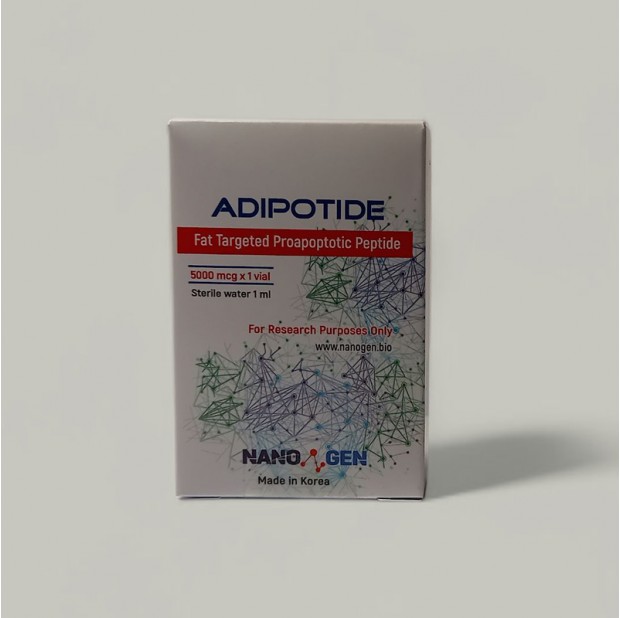Adipotide FTPP (5mg)
- BrandsNANOGEN.BIO
- Product Code: Fat Targeted Proapoptotic Peptide 5 mg
- Availability: In Stock
-
32.68€
Adipotide FTPP peptide helps stimulate apoptosis in adipose tissue endothelium, reduces food intake and lowers body weight. Apoptosis is one of the main types of cell death, in which a series of molecular actions in the cell leads to its death.The Adipotide FTPP peptide belongs to the category of pro-apoptotic peptides, the main purpose of which is to destroy fat cells. Most likely, the full blood supply to the adipose tissue itself is stopped, while the blood supply to the vessels that supply blood to the rest of the body remains unchanged. Since adipose tissue is saturated with blood vessels, changes aimed at improving the vascular network of adipose tissue are likely to become a new innovative method for reducing fat deposits. During research on the Adipotide FTPP peptide, changes caused by endothelial apoptosis in white adipose tissue were observed after application, demonstrating a significant reduction in body weight. The results of scientific research on the Adipotide peptide (Fat Targeted Proapoptotic Peptide) help to understand how blocking the vascular network of adipose tissue affects important factors that alter energy balance regulation, as well as the neuroendocrine system that supports energy balance.
The use of Adipotide FTPP peptide has demonstrated the potential usefulness of the drug in treating symptoms of type 2 diabetes, with improvements in insulin resistance and weight loss.
HOW DOES ADIPOTIDE (Fat Targeted Proapoptotic Peptide) WORK? It is generally accepted that Adipotide FTPP works through a process of interaction triggered by binding to receptors of proteins such as Annexin A2 and Prohibitin. Annexin II and Prohibitin (PHB) are multifunctional proteins encoded in the human body by the PHB gene. Annexin II is a protein encoded in the human body by the ANXA2 gene. Observations of these receptors have demonstrated the likelihood of their manifestation in a significant range of cells, and all analyses indicate the likelihood of the creation of an exclusive system of prohibitin-ANXA2 receptors, with an effect on white adipose tissue. It was the location of these receptors on the endothelial cells of blood vessels supporting white fat cells that suggested that these receptors may play an important role in regulating the transport of fatty acids in adipose tissue from the endothelium to adipocytes. The drugs being developed, based on the biochemical interaction between Annexin II and Prohibitin (PHB) receptors, are capable of transporting fatty acids in adipose tissue, which may lead to the creation of a new therapeutic method for treating metabolic diseases.
The structure of Adipotide (Fat Targeted Proapoptotic Peptide) is so unique that it is precisely due to its 9 amino acid sequences that it exhibits such a specific similarity to the ANXA2-prohibitin receptor interaction system. By using the injectable Adipotide FTPP peptide, we direct the proapoptotic peptide to the fat vascular system towards prohibitin. This action was followed by the subsequent destruction of white fat, which had a beneficial effect on the normalisation of metabolism with a reduction in fat reserves.
Adipotide bodybuilding: Research is currently underway to reveal the potential benefits of using Adipotide FTPP for fitness and bodybuilding. According to research, the properties of endogenous prohitin proteins can regulate functions related to cell formation, as well as participate in metabolism and eliminate inflammation. Undoubtedly, these properties of Adipotide FTPP may be of interest in bodybuilding. The potential of Adipotide FTPP in the fight against obesity may generate increased interest in its use for reducing fat stores and normalising metabolic processes in the near future. There is still no scientifically proven Adipotide peptide dosage chart for safe use that guarantees 100% weight loss, and the Adipotide dosage is mainly based on poorly studied dosages found on various thematic Internet resources. We hope that Adipotide FTPP will soon be sufficiently studied to be used not only as a means of combating obesity but also as a means of destroying cancer cells. It is the disclosure of all the possibilities of Adipotide FTPP that will create a complete picture of Adipotide results in the field of application in the case of diseases such as type 2 diabetes. Only significant scientific research can guarantee the safety of use with a specific protocol capable of minimising the side effects of Adipotide. Research will enable the creation of an innovative Adipotide-based drug that may be available for purchase in pharmacies. Given the significant potential of Adipotide FTPP peptide, it is highly desirable that the price be affordable for everyone and that Adipotide peptide be available for sale without unnecessary overcharges. The task for many scientists involved in the study of this compound is to understand the full potential of Adipotide FTPP peptide's effect on cells. We can only understand how sensitive Adipotide is to insulin or glucose metabolism by reading reviews, as it is Adipotide reviews that form a rough idea on this issue.

